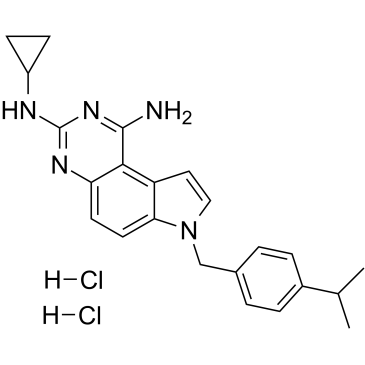| Description |
SCH79797 dihydrochloride is a highly potent, selective nonpeptide protease activated receptor 1 (PAR1) antagonist. SCH79797 dihydrochloride inhibits binding of a high-affinity thrombin receptor-activating peptide to PAR1 with an IC50 of 70 nM and a Ki of 35 nM. SCH79797 dihydrochloride inhibits thrombin-induced platelet aggregation with an IC50 of 3 μM. SCH79797 dihydrochloride has antiproliferative and pro-apoptotic effects, and limits myocardial ischemia/reperfusion injury in rat hearts. SCH79797 dihydrochloride also potently prevents PAR1 activation in vascular smooth muscle cells, endothelial cells, and astrocytes[1][2][3][4].
|
| Related Catalog |
|
| Target |
Protease activated receptor 1 (PAR1)[1]; Apoptosis[3]
|
| In Vitro |
SCH79797 inhibits high-affinity thrombin receptor-activating peptide ([3H]haTRAP) binding in a competitive manner. SCH79797 inhibits α-thrombin- and haTRAP-induced aggregation of human platelets, but does not inhibit human platelet aggregation induced by the tethered ligand agonist for protease-activated receptor-4 (PAR-4), γ-thrombin, ADP, or collagen. Thrombin produces transient increases in cytosolic free Ca2+ concentration ([Ca2+]i) in hCASMC. SCH79797 effectively inhibits this increase in [Ca2+]i. SCH79797 completely inhibits Thrombin- and TK-stimulated [3H]thymidine incorporation [1]. SCH79797 is able to interfere with the growth of several human and mouse cell lines, in a concentration-dependent manner. The ED50 for growth inhibition iss 75 nM, 81 nM and 116 nM for NIH 3T3, HEK 293 and A375 cells, respectively. In NIH 3T3 cells, SCH79797 inhibits serum-stimulated activation of p44/p42 mitogen-activated protein kinases (MAPK) at low concentrations and induces apoptosis at higher concentrations[2].
|
| In Vivo |
SCH79797 (2.5-250 μg/kg; intravenous injection; male Sprague Dawley rats) treatment immediately before or during ischemia reduces myocardial necrosis following I/R in the intact rat heart in two rat models of myocardial ischemia/reperfusion (I/R) injury. This response is dose-dependent with the optimal dose being 25 μg/kg[4]. Animal Model: Male Sprague Dawley rats (8 weeks of age) with myocardial I/R injury[4] Dosage: 2.5 μg/kg, 10 μg/kg, 25 μg/kg, 50 μg/kg, 100 μg/kg, and 250 μg/kg Administration: Intravenous injection Result: Immediately before or during ischemia reduced myocardial necrosis following I/R in the intact rat heart.
|
| References |
[1]. Ahn HS, et al. Inhibition of cellular action of thrombin by N3-cyclopropyl-7-[[4-(1-methylethyl)phenyl]methyl]-7H-pyrrolo[3, 2-f]quinazoline-1,3-diamine (SCH 79797), a nonpeptide thrombin receptor antagonist. Biochem Pharmacol. 2000 Nov 15;60(10):1425-34. [2]. Di Serio C, et al. Protease-activated receptor 1-selective antagonist SCH79797 inhibits cell proliferation and induces apoptosis by a protease-activated receptor 1-independent mechanism. Basic Clin Pharmacol Toxicol. 2007 Jul;101(1):63-9. [3]. Sokolova E, et al. A novel therapeutic target in various lung diseases: airway proteases and protease-activated receptors. Pharmacol Ther. 2007 Jul;115(1):70-83. [4]. Strande JL, et al. SCH 79797, a selective PAR1 antagonist, limits myocardial ischemia/reperfusion injury in rat hearts. Basic Res Cardiol. 2007 Jul;102(4):350-8.
|
